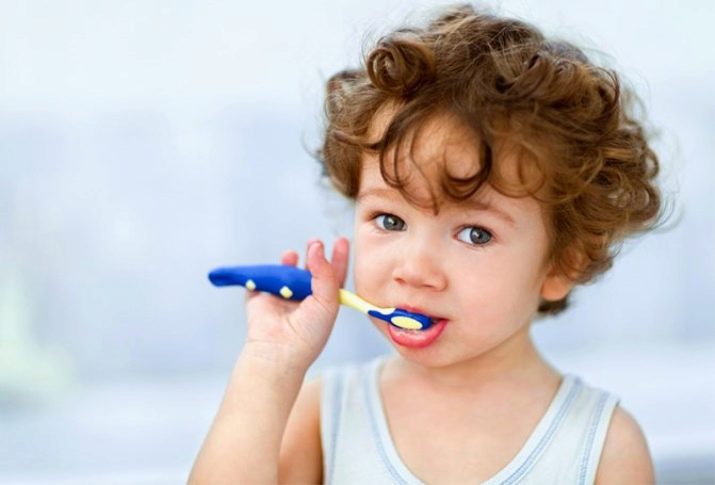How to teach a child to brush their teeth?
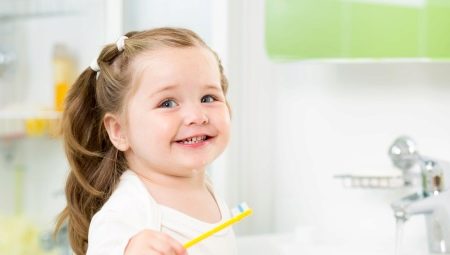
Brushing your teeth is a skill, habit, hygienic procedure, the need for which does not need argumentation. Another question is that teaching a child to brush his teeth every day sometimes becomes a real challenge. Someone peacefully follows the lessons of a parent, while someone avoids the ritual under any pretext. Fortunately, there is a way out, and more than one.
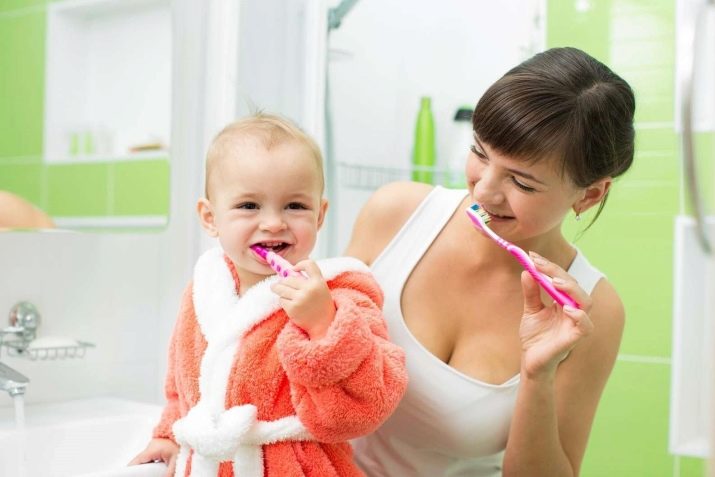
How to instill an understanding of the need for cleaning?
All lectures, notations, conversations and other little illustrative, terribly tedious in presentation "content" should be immediately deleted from the training plan. A small child needs to be explained vital things in a language that is understandable to him, and most importantly - interesting. At about 2 years old, the child already confidently picks up the brushes, less confidently, but still squeezes the paste onto the brush and makes movements that can be attributed to brushing the teeth. If this is an automatic ritual, it is unlikely that the baby will do it with due zeal.
He needs an argument - why to clean, and why it is interesting.
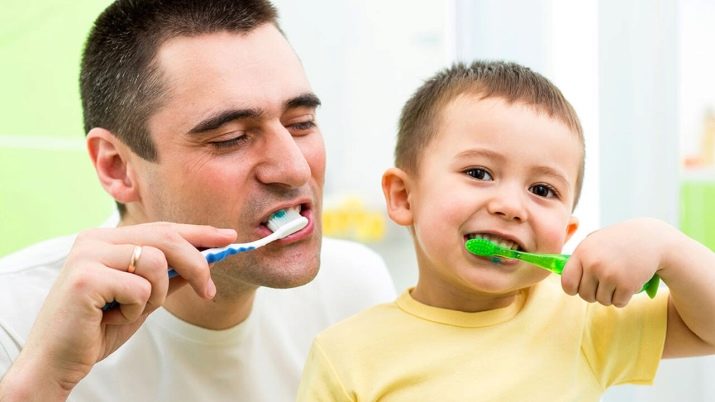
Different things help in understanding the need for a hygienic procedure.
-
Educational cartoons. For example, "Kind Doctor Dentist", "Bird Tari". The guys enthusiastically watch cartoons that explain clearly, vividly, natively what their parents want from them. If the kid especially liked the cartoon, you can draw (make a screen, print) the hero you love and stick it temporarily on the bathroom door. A good association will work.
-
Reading fairy tales. Many children are audials, they are impressed by what they hear. Therefore, you can teach to brush your teeth in this way.Moreover, the tale may be the authorship of the parents, multi-part, and each new series is told to the child only after the ritual of brushing the teeth.
-
Educational books. The ones that have windows and pockets where you can literally open the character's mouth and see what's inside.
-
Puppet show. Parents themselves can play the scene of an unfortunate animal that has no paste and a brush.
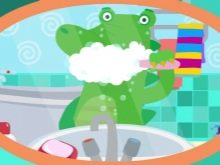

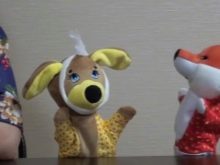
The bottom line is clear: in a playful way, you need to tell the child that brushing is important, and that he too has grown up and finally gets his own brush, his own toothpaste and a children's timer for brushing his teeth. There are different timers: some are sold with the paste. You can just buy a small hourglass, and while the sand is poured, the child obediently brushes his teeth for 2 minutes. Of course, those parents who solemnly play up the moment of growing up will win: the brush can be tied with a ribbon or placed in a bright box and left on the children's bedside table. As a gift from the Tooth Fairy.
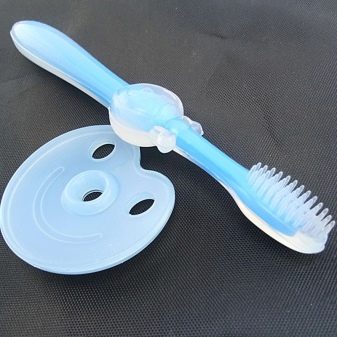
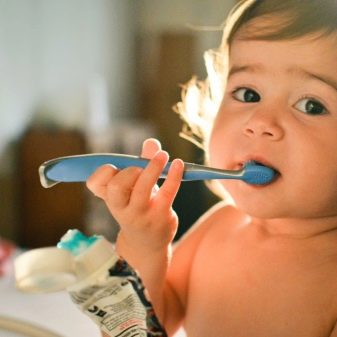
How to teach how to brush your teeth correctly?
Let's say the baby understands the importance of the procedure, does not argue with the parents and actively goes to the bathroom. But even more important is whether he brushes his teeth correctly, whether the procedure has become formal.
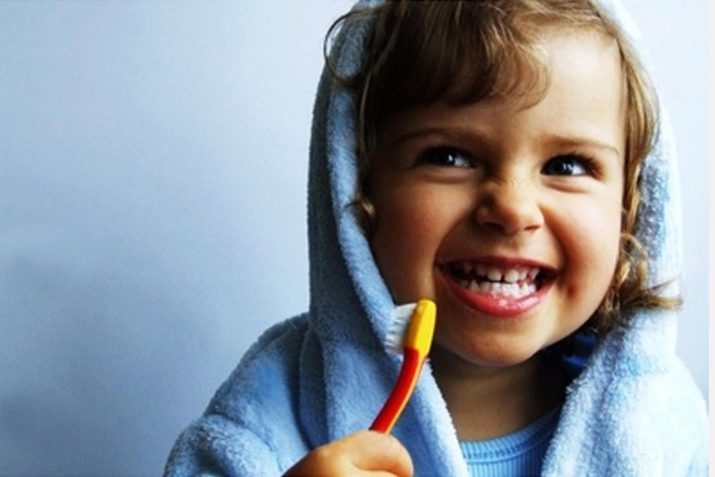
The time allotted for cleaning is at least 2 minutes. For a baby, it can be increased to 3 minutes, because he is still sluggish. The procedure is carried out in the morning and in the evening, nothing else.
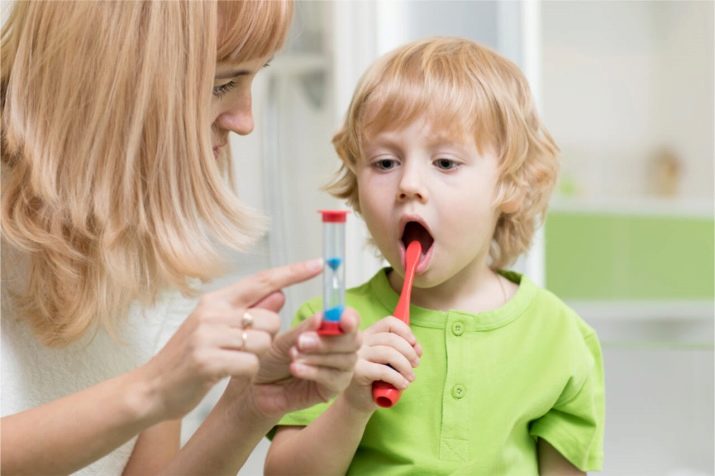
Let's take a look at the rules for brushing teeth for babies.
-
Hold the toothbrush at an angle of 45 degrees. First, the parent points to himself, then puts his hand to the baby. To keep the baby on course, you can show the technique on the toy: the mother holds the bear and the brush in his paw and notes how the bear holds the brush correctly. The child repeats with pleasure independently.
-
The movements of the brush are sweeping, going from the gum to the edge of the tooth. It is convenient to show it in a book with three-dimensional images.
-
We clean the teeth inside and out, without "offending" any of the sides. And be sure to clean the tongue, because the procedure is related to oral hygiene, which means that it is necessary to put both the teeth and the tongue in order.
-
The chewing surface of the teeth is cleaned with forward circular movements. The child repeats after the adult. You can call this movement "circle" - the baby is happy to spin the brush over the surface of the tooth. You can do it on account.
-
Closing the jaw, you need to massage the gums. The child is explained that the gums are like beds from which the teeth grow. And they must be weeded, only gently and carefully.
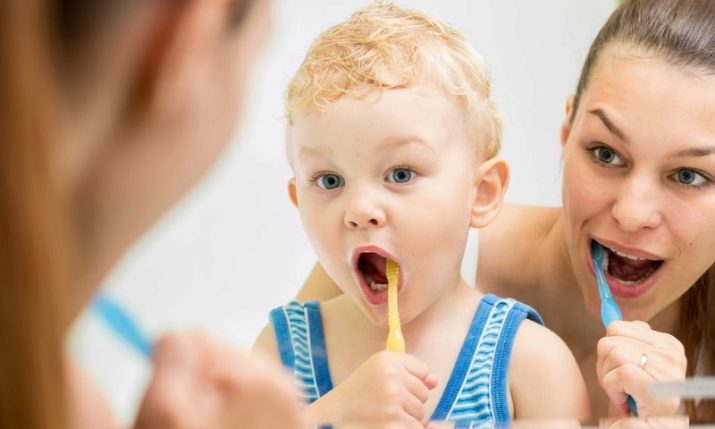
Teaching to clean properly is not a matter of one day. You cannot rush and scold a kid who does not immediately understand everything, does it awkwardly and gets upset because of his mistakes. This is learning, with its successes and failures. Of course, the baby needs to be motivated. For example, attach the Poster of Achievement to the inside of the bathroom door. If the kid has done well, mark this business with a funny sticker opposite the date or day of the week in such a poster-calendar. Or let the kid choose the most promotional sticker from the set.
Everything that the parent plays up, the child learns much more successfully.
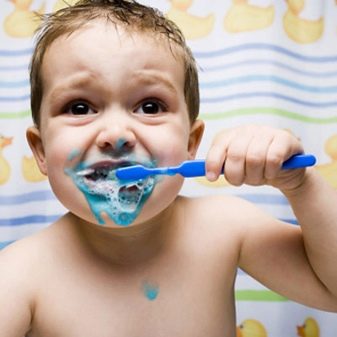
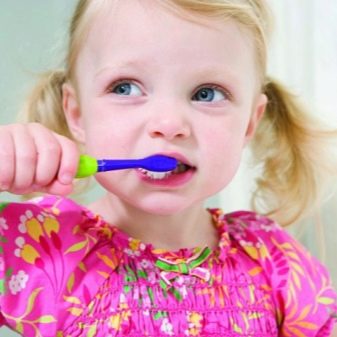
What if the child refuses?
Perhaps he was frightened, and that's the only thing. For example, the first pasta tasted bad. Or the day before, he first came to the dentist, and he did not like it at all. Finally, for a two-year-old baby it can be difficult, or some other associations do not allow him to calmly learn such a simple matter.
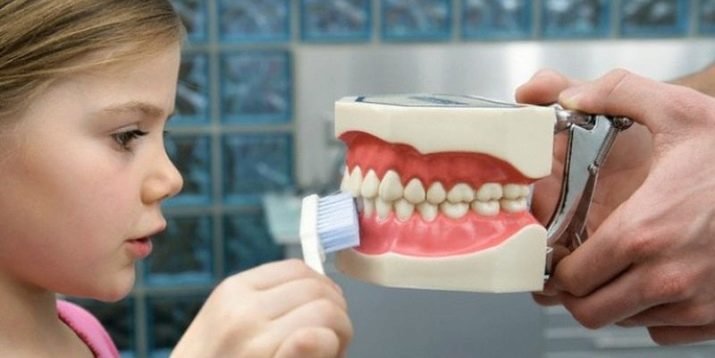
If the child does not want / does not like to brush his teeth, parenting tricks are used.
-
His favorite toy can persuade him. It all depends on the efforts of the parents. An almost win-win option is to record a mini-cartoon. Dad or mom sit under the table, hold in their hands (imperceptibly) a beloved bear / bunny baby. And the one next to the glass, in which children's pasta and a cute brush flaunt, asks the baby to follow his example and be sure to brush his teeth.The voice can then be changed to cartoon in the simplest editing program. For a child, such a cartoon will be a miracle, and it is likely that the bear or bunny will be able to persuade the child.
-
Tell that the pasta was offended by the baby and disappeared somewhere. Of course, it takes a bit of acting to get Mom and Dad looking around the house with enthusiasm for the tube. The child must be willing to participate in the quest. And, of course, he must be the one who finds him. Cleansing loyalty is likely to increase after such an adventure.
-
To find a very good doctor who, like a magician, shows miraculous instruments and presents some medical trifles from the category of “miraculous miracles” for the kid. There are such doctors, and if you make inquiries, you can find a doctor in a vivid form, with jokes, jokes, a colorful office, where everything delights the child. Sometimes, after such an excursion to the supercabinet, the kid changes his mind about brushing his teeth.
-
Entrust the child to choose the paste and brush for himself. Such conditions bribe many.
-
During cleaning, include a funny song that the little one wants to hear more than once.
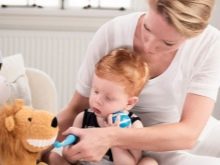
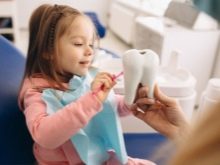
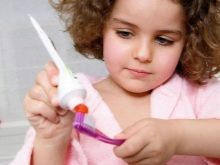
But there are some things you shouldn't do.
-
Frighten with scary stories about tooth decay and hellish toothache. It is not a fact that the bridge of associations will form in the baby's head correctly. Perhaps the scary story will only be associated with a paste and a brush.
-
Promise candy or other food, delicious treats for each cleansing ritual. This is wrong on either side, it diminishes the authority of the parent and also builds up the wrong connections. The logic should be simple: brushing my teeth is healthy and healthy, because I want to be healthy, smart and just a good fellow. And not because they will give me something for it.
-
Threaten the dental chair. All threats other than paralyzing fear cause nothing. "Intimidate" is the most stupid tactic for a young child.
-
Scream and punish. As a rule, this does not work well. As a rule, this builds a far from trusting and warm relationship between the child and the parents. If the kid starts brushing his teeth, fearing punishment, he will do it badly, without any understanding of the value of the process.
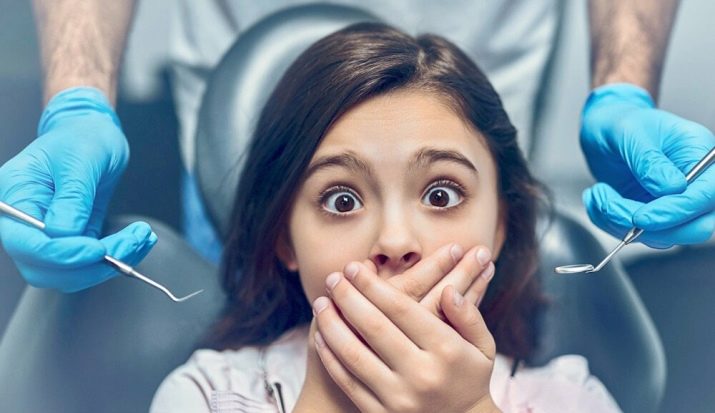
At least one of the methods and techniques will work. Of course, a parent needs to be patient and ready to be the most creative.
Helpful advice for parents
Child psychologists, having enlisted the help of pediatric dentists, have developed more than one list of recommendations that greatly facilitate the process of teaching a child to brush their teeth. Parents note - the most interesting tips from these lists.
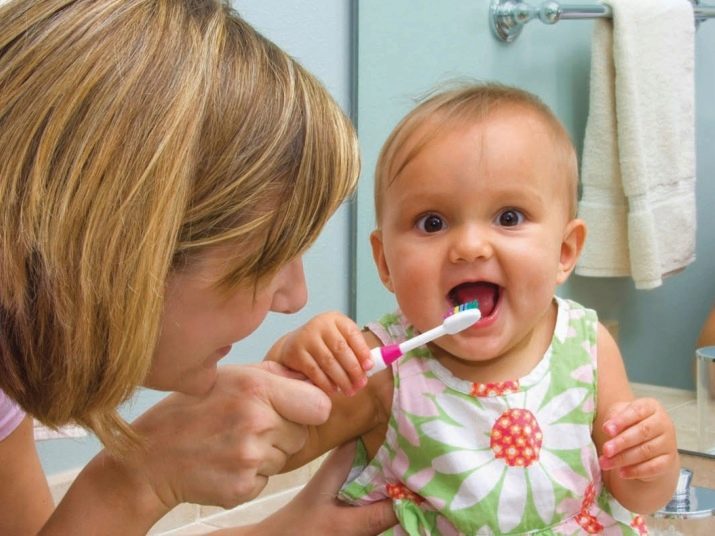
-
You can't push. This will cause a rebuff in the baby. More humor, patience, readiness for conversation and understanding looks from the elder side - this disposes any kid. It's just that someone is faster, someone is not right away.
-
Your own example is required. The child should see how with pleasure and how diligently the parents brush their teeth every morning and every evening. To the music, dancing, smiling at yourself in the mirror - whatever you like, but this kind of positive reinforcement also works.
-
Fixing successes. Everyone needs praise, and children need it. And oral first of all. Gifts are good, but not all efforts should be financially rewarding. But sincere parental delight, affection, admiration are just as important for the baby, they tell him a lot about themselves and build warm relationships with elders.
-
Getting used to going to the dentist. Let it run parallel to learning how to brush your teeth. The sooner the baby realizes that the doctor is fun, informative and not painful, the more likely it is that this association will last for life. You should not delay the moment of visiting the dentist and make it sacred: the easier and more fun, the less fear the child has. Of course, you need to find a good doctor.
-
A little bit of magic. There are baby pastes on sale that change color during cleaning. The foam turns green, and this trick is only possible by brushing your teeth.Such fiction does not leave children indifferent.
-
We compete. Who cleans better - a child or a dad, you can hold such a competition. Of course, dad will have to play giveaway, but this is for the sake of a common cause. The mother-judge will strictly and justly pronounce the verdict, the winner will be glorified and honored. And let him also teach dad, who suddenly forgot the rules of cleaning.
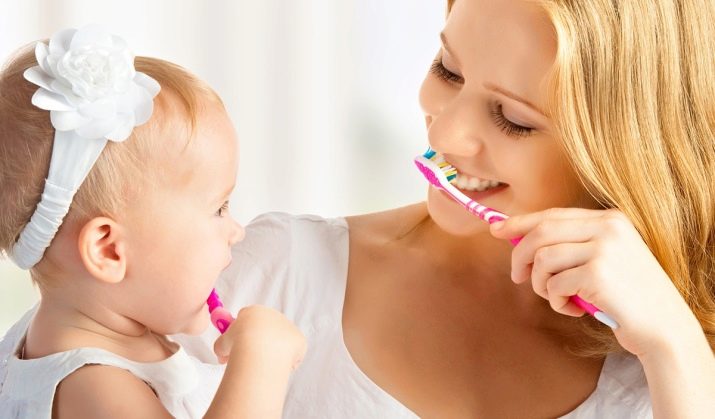
It turns out that all the schedules, cleaning calendars, strict rules are needed by the parents, and the baby comprehends such things in a playful way. And if moms and dads remember this, with a guarantee of almost 100% there will be no problems with teaching oral hygiene in the family.
